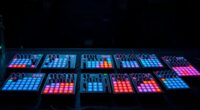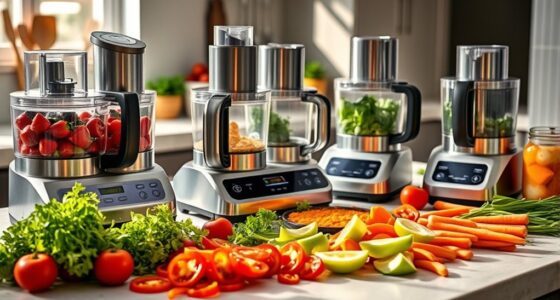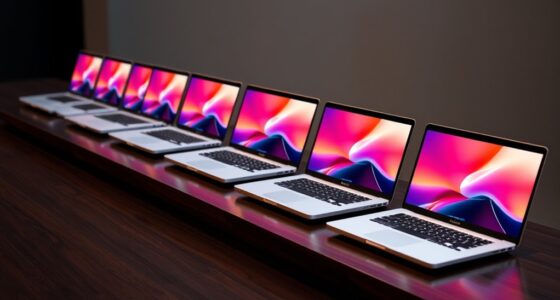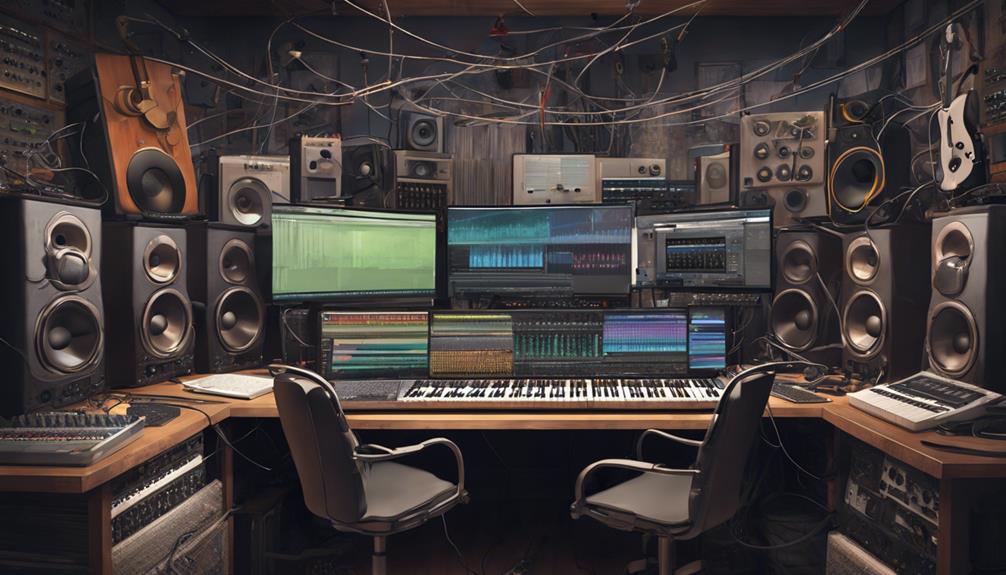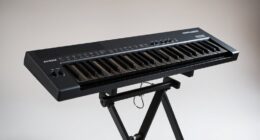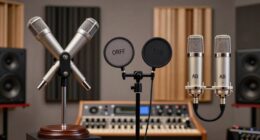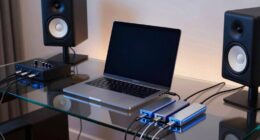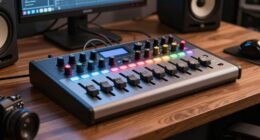If you’re searching for the best 88-key MIDI controllers in 2025, I’ve compared top models based on key action, build quality, compatibility, and portability. Major options include the M-Audio Keystation 88 MK3, Arturia KeyLab Essential 88 mk3, Nektar Impact GX61, Casio Privia PX-870, and more. Whether you want authentic piano feel or versatile production controls, I’ll guide you through the top picks so you can find the right fit for your needs. Keep exploring to see which one suits you best.
Key Takeaways
- Prioritize models with full-weighted, hammer-action keys for authentic piano feel and expressive performance.
- Ensure compatibility with major DAWs and versatile connectivity options like USB-C, MIDI out, and sustain pedal inputs.
- Consider portability features such as lightweight, foldable designs ideal for stage, studio, or travel use.
- Look for controllers offering extensive control options, including knobs, faders, pads, and transport controls for creative flexibility.
- Balance price and features by choosing from budget, mid-range, or premium models based on your skill level and performance needs.
M-Audio Keystation 88 MK3 MIDI Keyboard Controller

If you’re looking for an affordable and versatile MIDI controller that delivers expressive control, the M-Audio Keystation 88 MK3 is an excellent choice. It features 88 full-size velocity-sensitive semi-weighted keys, perfect for dynamics and performance. The controller includes essential controls like a volume fader, transport buttons, pitch and modulation wheels, and octave switches, making it highly functional. It connects easily via USB to Mac, PC, or iOS devices, with no drivers needed. Its slim design fits seamlessly on any desk or stage. Plus, it comes with software like Ableton Live Lite and MPC Beats, making it ready for production and live use straight out of the box.
Best For: musicians, producers, and performers seeking an affordable, full-size MIDI keyboard with expressive control for studio, home, or stage use.
Pros:
- Fully weighted, velocity-sensitive 88 keys for dynamic performances
- Plug-and-play USB connection compatible with Mac, PC, and iOS devices, no drivers required
- Comes with essential production software like Ableton Live Lite and MPC Beats for immediate use
Cons:
- No built-in display or advanced control features beyond basic controls
- Lacks external power supply, relying solely on USB power which may be limiting in some setups
- Limited to semi-weighted keys without aftertouch or hammer action for highly expressive playing
Arturia KeyLab Essential 88 mk3 USB MIDI Controller Keyboard
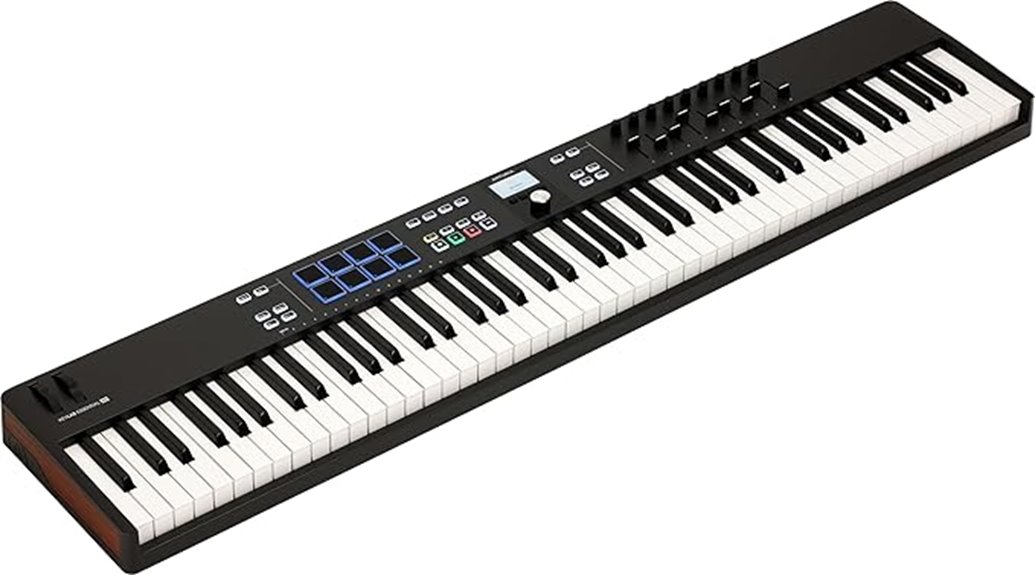
The Arturia KeyLab Essential 88 mk3 stands out as an excellent choice for electronic musicians and producers seeking a versatile, portable MIDI controller. Its semi-weighted keys deliver a satisfying, synth-like feel, ideal for dynamic playing. Weighing about 21.6 pounds, it’s sturdy yet portable, with a solid build that withstands frequent use. The controller features nine mixer channels and integrates seamlessly with Windows and Mac, supporting USB-C and USB-B connections. Included software like Ableton Live Lite and Analog Lab V enhances creative flexibility. While the plastic build feels a bit cheap, users generally praise its performance, control options, and value for professional and home studio setups.
Best For: electronic musicians and producers seeking a portable, versatile MIDI controller with excellent software integration and expressive playing capabilities.
Pros:
- Semi-weighted keys provide a satisfying, synth-like feel suitable for dynamic performances
- Seamless integration with Windows and Mac, supporting USB-C and USB-B connections
- Includes powerful software bundles like Ableton Live Lite and Analog Lab V, enhancing creative options
Cons:
- Plastic build quality may feel cheap or less durable over time
- Keybed not fully weighted, which might be less suitable for serious piano players
- Some users report that the system requirements for handling extensive features can be high
Nektar SE61 USB MIDI Controller Keyboard

The Nektar SE61 USB MIDI Controller Keyboard stands out as a versatile and budget-friendly option for musicians new to music production or those seeking a portable controller. It features 61 full-sized, velocity-sensitive keys, making it comfortable to play and suitable for various musical styles. Compatible with all major DAWs and platforms like Mac, PC, iOS, and Linux, it offers seamless integration, including Nektar’s DAW control. Its lightweight, sleek design makes it ideal for home studios, practice, or live use. While the plastic build feels cheap, the responsive keys and plug-and-play setup deliver excellent value, especially at around $100.
Best For: beginners, home studio enthusiasts, and portable musicians seeking an affordable, versatile MIDI controller for music production and live performance.
Pros:
- Affordable price point around $100 offers great value for essential features
- Compatible with all major DAWs and platforms including Mac, PC, iOS, and Linux
- Lightweight and portable, ideal for travel, practice, and small studio setups
Cons:
- Plastic build feels cheap and may lack durability over time
- Keys, while responsive, are plastic and may not satisfy users seeking a premium feel
- Lacks a built-in sustain pedal, requiring an external pedal for certain playing styles
Nektar Impact GX61 USB MIDI Controller Keyboard

Designed for musicians who need a portable yet versatile MIDI controller, the Nektar Impact GX61 features 61 expressive synth-action keys that deliver dynamic performance. It includes on-board pitch bend and modulation wheels, allowing real-time expression. Compatible with Mac, PC, and iOS devices, it integrates seamlessly with most popular DAWs thanks to Nektar’s dedicated support. With 14 MIDI assignable buttons, you can customize controls for various production or live needs. It comes with Bitwig 8-Track, so you can start creating immediately. This lightweight, high-quality keyboard is perfect for studio or stage, combining portability with powerful control features.
Best For: musicians and producers seeking a portable, versatile MIDI controller with high-quality keys and customizable controls for studio and live performances.
Pros:
- Offers 61 expressive synth-action keys for dynamic performance
- Compatible with Mac, PC, and iOS devices, ensuring seamless integration
- Includes 14 MIDI assignable buttons for extensive customization
Cons:
- May require consulting the user guide for optimal setup and use
- Limited to 8 tracks in the included DAW, which might be restrictive for advanced production
- Lacks built-in sounds or audio interface features, relying on external software and hardware
Casio Privia PX-870 Digital Piano
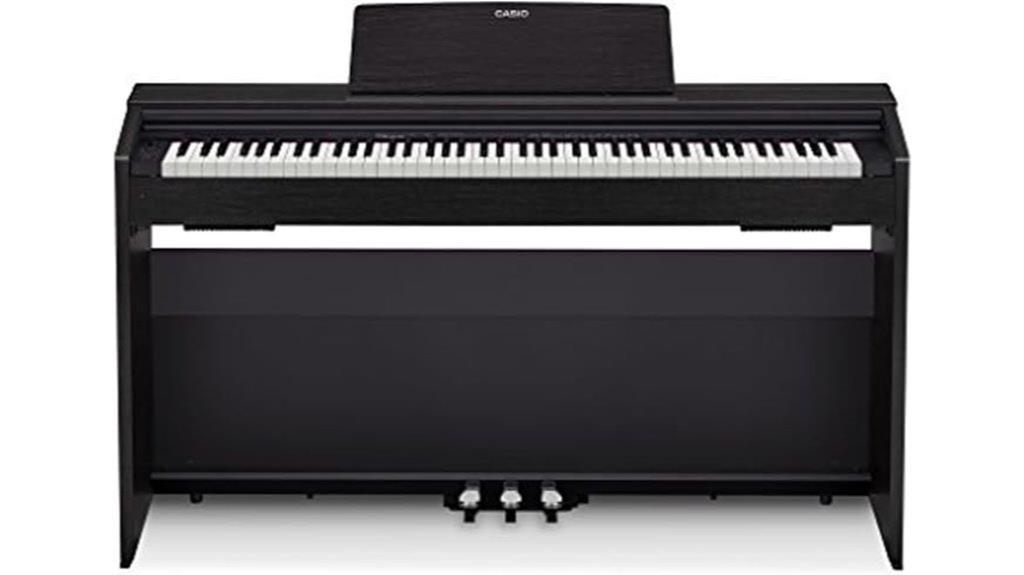
If you’re seeking an authentic playing experience that closely mimics a grand piano, the Casio Privia PX-870 Digital Piano stands out thanks to its 88-key Tri-Sensor II Scaled Hammer Action. This key action delivers a realistic touch, capturing nuances with speed and accuracy, and features simulated ebony and ivory textures for added feel. Its AiR Sound Source produces rich, detailed grand piano sounds, enhanced by advanced resonance and mechanical effects for depth. The built-in 40W four-speaker system fills the room with immersive audio, and features like Duet Mode, multiple songs, and MIDI connectivity make practice versatile and engaging. It’s a sleek, functional instrument for serious players.
Best For: serious piano players and music enthusiasts seeking an authentic grand piano experience with versatile features and realistic touch.
Pros:
- Authentic 88-key Tri-Sensor II Scaled Hammer Action with textured ebony and ivory surfaces for realistic feel
- Rich, detailed sound quality with advanced resonance and mechanical effects via AiR Sound Source
- Built-in practice tools like Duet Mode, multiple songs, and MIDI connectivity for versatile learning and performance
Cons:
- Premium features may come with a higher price point compared to entry-level digital pianos
- Bulkier design might require more space for setup and storage
- Limited onboard voices and styles primarily focused on grand piano sound, less variety for different genres
88-Key Semi-Weighted Keyboard Piano for Beginners with MIDI, Bluetooth, Tones, Rhythms, Demos, Pedal, Metronome, and Teaching Mode
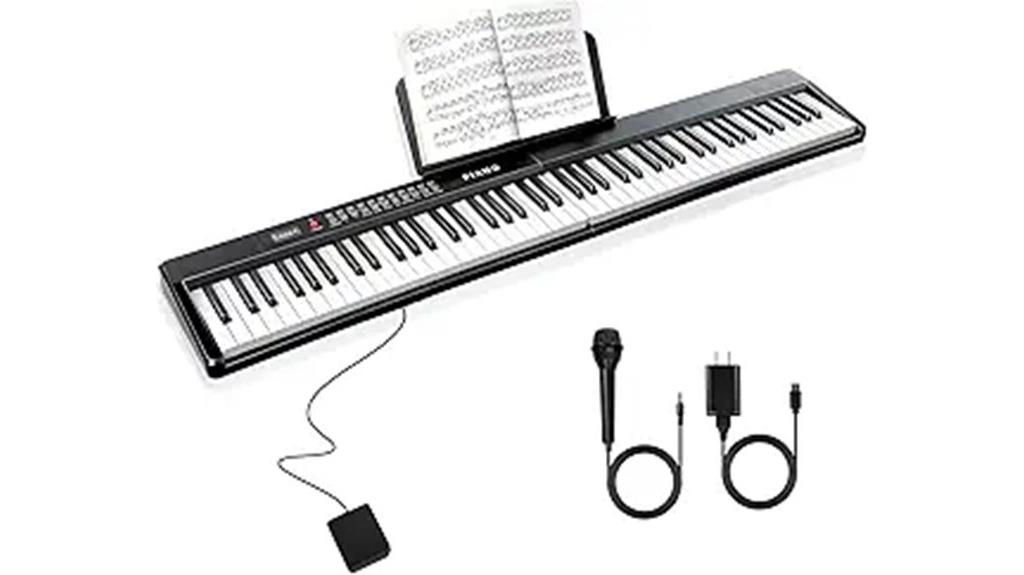
Beginners seeking an affordable, versatile keyboard will appreciate this 88-key semi-weighted piano, which combines essential features like MIDI, Bluetooth, and a variety of tones and rhythms. It offers 150 demo songs, 1000 tones, and 1000 rhythms, making practice engaging and varied. The foldable design enhances portability, while the included accessories—pedal, microphone, music stand, stickers, and cables—support learning and performance. Its semi-weighted keys mimic a real piano feel, and built-in teaching modes help beginners learn effectively. Connectivity options like Bluetooth and USB MIDI allow easy device pairing for recording and music editing. Despite some durability concerns, it’s a well-rounded choice for newcomers.
Best For: beginners and young learners seeking an affordable, portable digital piano with versatile features and educational tools.
Pros:
- Includes a wide variety of tones, rhythms, and demo songs to enhance practice sessions.
- Foldable design makes it easy to transport and store, ideal for on-the-go learning.
- Built-in teaching modes and accessories like stickers and microphone support effective learning.
Cons:
- Some users report flimsy construction and stability issues with the foldable design.
- Speakers and accessories such as headphones and pedal may be of lower quality and less durable.
- Limited guidance in the instruction booklet and potential durability concerns could affect long-term use.
Roland FP-E50 Digital Piano

The Roland FP-E50 Digital Piano stands out for musicians seeking a versatile instrument that combines authentic sound with advanced features. It delivers a realistic grand piano tone powered by Roland’s SuperNATURAL Piano engine and a PHA-4 Standard hammer-action keyboard that mimics real keys. With over 1,000 onboard sounds, including synths, orchestral, and guitar tones, plus expandable options through Roland Cloud, it offers creative flexibility. Its interactive accompaniments and built-in recording make practice engaging. Bluetooth connectivity, vocal effects, and app control enhance performance. While some users cite sound quality and firmware issues, overall, it’s a portable, feature-rich choice for learners and performers alike.
Best For: musicians and students seeking a portable, feature-rich digital piano with authentic sound and versatile performance capabilities.
Pros:
- Realistic grand piano sound with SuperNATURAL engine and weighted keys for authentic touch
- Wide array of onboard sounds and expandable options via Roland Cloud for creative flexibility
- Bluetooth connectivity, vocal effects, and app control enhance learning and performance
Cons:
- Some users report sound quality issues, describing it as tinny or lacking realism
- Firmware updates can be complicated, with some settings not saving properly after power off
- Occasional concerns about key action and build quality, including click or rattle noises
Native Instruments Komplete Kontrol A49 Controller Keyboard (25237)
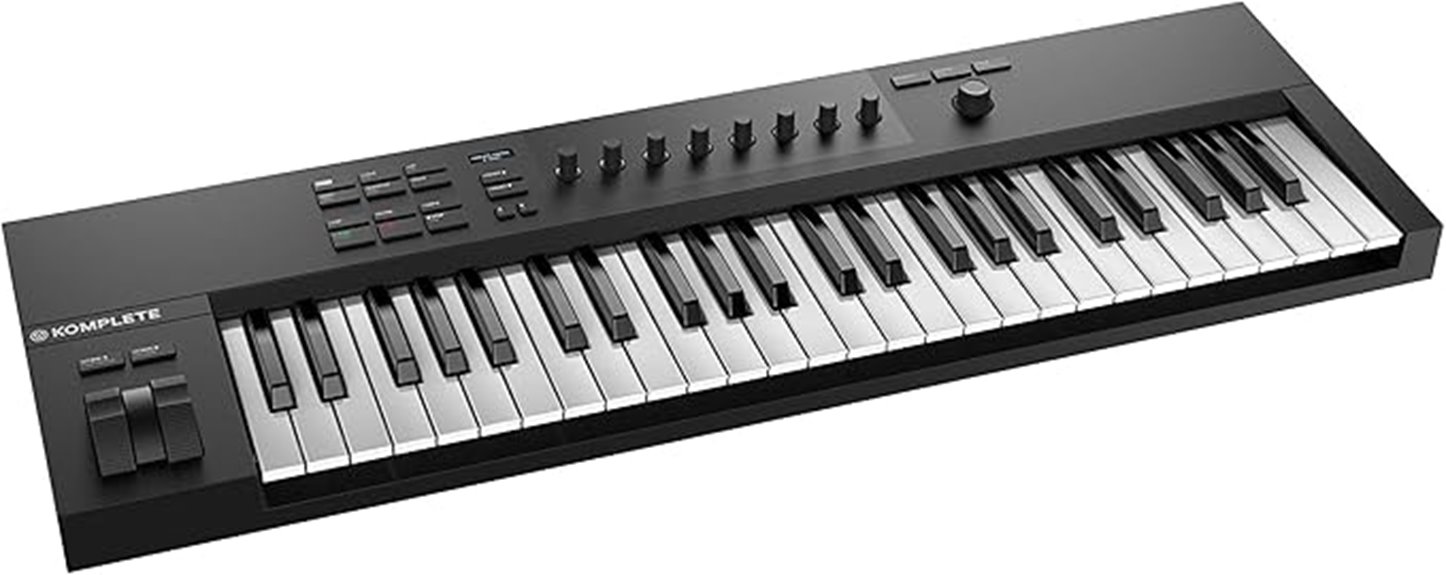
The Native Instruments Komplete Kontrol A49 Controller Keyboard stands out as an ideal choice for musicians who prioritize seamless integration with Native Instruments software and a premium playing experience. Its 49 full-sized, semi-weighted keys deliver great feel, while the OLED display and touch-sensitive knobs facilitate quick adjustments. Designed mainly for NI’s ecosystem, it offers plug-and-play functionality with NI/NKS instruments and broad DAW compatibility, including Logic, Ableton, and Cubase. Built with durability and professional aesthetics in mind, it’s perfect for both beginners and experienced users seeking a reliable, streamlined MIDI controller that enhances workflow and sound flexibility.
Best For: musicians and producers seeking a premium, easy-to-use MIDI controller with seamless Native Instruments integration and high-quality keys.
Pros:
- Full-sized, semi-weighted keys provide a natural, expressive playing experience
- Intuitive OLED display and touch-sensitive knobs for quick navigation and control
- Excellent software bundle and plug-and-play compatibility with NI/NKS instruments and major DAWs
Cons:
- Slight plastic smell reported by some users even after extended use
- USB plug can be difficult to remove due to a slippery design
- Lacks additional features like pads or faders found on higher-end controllers
Nektar, 49-Key Midi Controller (SE49),Black white Grey

If you’re looking for an affordable and portable MIDI controller that doesn’t compromise on essential features, the Nektar SE49 is an excellent choice. It offers a 49-key, velocity-sensitive keyboard with a natural feel, plus intuitive controls like modulation, pitch bend, sliders, octave, and transpose buttons. Compatible with most major DAWs and operating systems, setup is simple with USB plug-and-play, and it supports iOS devices. Its slim, lightweight design makes it ideal for home studios, practice, or travel. While some note stiff keys, overall, it delivers solid performance for beginners and producers alike, making it a versatile, budget-friendly option.
Best For: beginners, home studio enthusiasts, and mobile musicians seeking an affordable, portable MIDI controller with essential features.
Pros:
- Compact, lightweight design for easy portability and space-saving setup
- Full-sized velocity-sensitive keys offering a natural playing feel
- Compatible with most major DAWs and operating systems, with straightforward plug-and-play setup
Cons:
- Some users report stiff or loud keys, which may affect playability
- No advanced controls or extensive pad options for professional-level production
- Minor latency issues with Bluetooth headphones or driver reinstallation in certain setups
midiplus i61 USB MIDI Keyboard controller

Designed for beginner and budget-conscious musicians, the midiplus i61 USB MIDI Keyboard Controller offers 61 velocity-sensitive keys that support all notes simultaneously, making it an ideal choice for home studios and live performances. Its compact, lightweight design (920 x 75 x 215 mm, 3kg) includes pitch and modulation wheels, a data entry wheel, and a Mode toggle button for quick control. It’s USB bus-powered and compatible with PCs, Macs, tablets, and smartphones, supporting popular DAWs like Ableton Live and FL Studio. While some users note stiffness or squeaking keys, overall, it provides reliable responsiveness and solid build quality at an affordable price point.
Best For: beginner and budget-conscious musicians seeking a portable, versatile MIDI controller for home studios or live performances.
Pros:
- Affordable price point with solid build quality
- Fully velocity-sensitive 61 keys supporting all notes simultaneously
- Compatible with a wide range of DAWs and devices, including PCs, Macs, tablets, and smartphones
Cons:
- Keys may feel stiff or squeak after prolonged use
- Limited advanced features like aftertouch and customizable sensitivity
- Occasional connectivity issues requiring troubleshooting or additional utilities
Carry-on 88 Key Folding Piano with USB MIDI
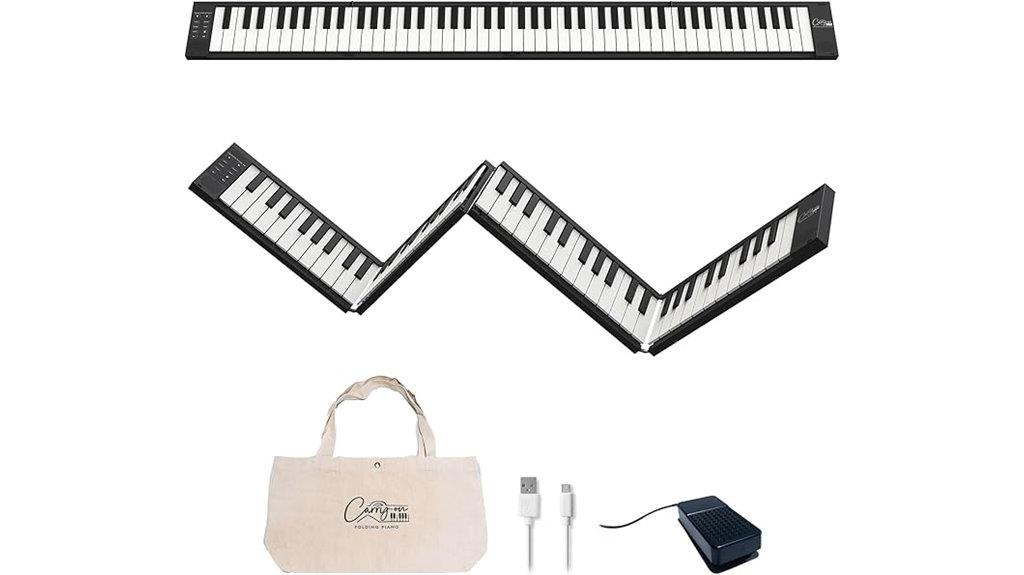
For musicians who need a lightweight, portable keyboard that’s easy to carry everywhere, the Carry-on 88 Key Folding Piano with USB MIDI stands out as an excellent choice. Weighing just 3.52 pounds, it easily fits into backpacks or travel bags, making it perfect for travel, practice, or casual use. Its foldable design, sturdy mechanism, and included cloth bag offer convenience and durability. While the keys provide a realistic feel and full 88-key layout, they’re not velocity-sensitive, limiting expressive playing. Built-in sounds are basic, but it’s great for MIDI control and on-the-go practice, especially for beginners or casual musicians.
Best For: casual musicians, students, and travelers seeking a lightweight, portable 88-key keyboard for practice and MIDI control.
Pros:
- Extremely lightweight and portable, weighing only 3.52 pounds, easy to carry in a backpack or travel bag
- Foldable design with sturdy mechanism and included cloth bag for convenient transport and storage
- Full-sized 88 keys with a realistic feel suitable for casual playing and practice
Cons:
- Keys are not velocity-sensitive, limiting dynamic expression during performances
- Basic onboard sounds and small speakers are not suitable for professional use or high-quality recording
- Plastic construction and shallow black keys may feel less durable and less realistic compared to higher-end models
Arturia MiniLab 3 MIDI Controller for Music Production
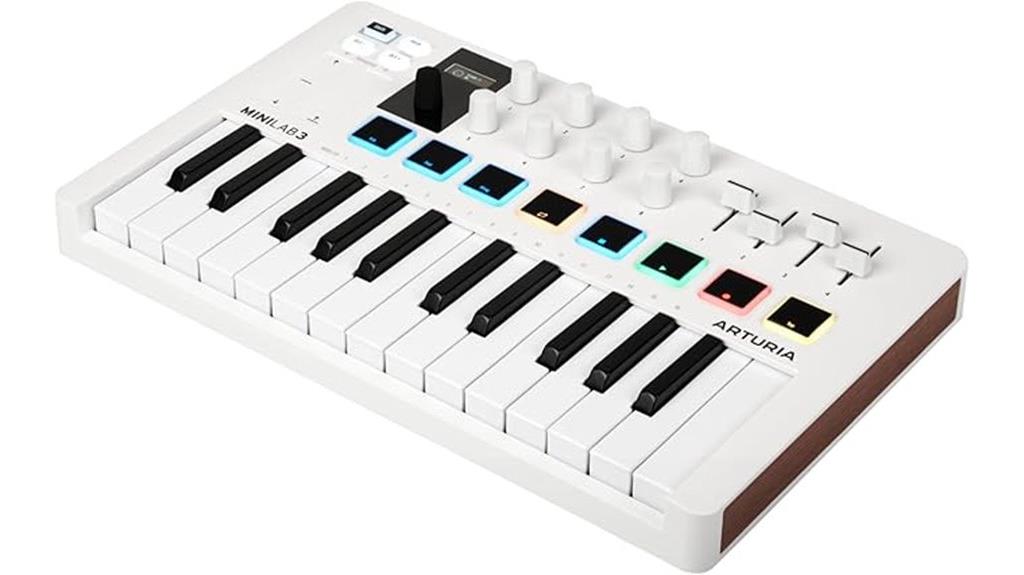
The Arturia MiniLab 3 MIDI Controller stands out as an excellent choice for musicians seeking a portable and versatile device that doesn’t compromise on control. Weighing just 2.2 pounds, it’s compact enough to take anywhere, yet packed with features like 25 velocity-sensitive keys, 8 RGB pads, rotary encoders, sliders, and a mini display for intuitive navigation. Its sleek design combines durability with style, including faux wood panels and a glossy finish. Compatible with Mac and Windows and seamlessly integrating with major DAWs, it also comes with a detailed software bundle, making it perfect for both studio work and live performances.
Best For: musicians and producers seeking a portable, versatile MIDI controller with professional features for both studio and live performance use.
Pros:
- Compact, lightweight design weighing only 2.2 pounds for easy portability
- Extensive control options including 25 velocity-sensitive keys, RGB pads, encoders, and sliders for versatile music creation
- Seamless integration with major DAWs and included comprehensive software bundle for immediate use
Cons:
- Minimal labeling on controls may require memorization for quick access
- Pads might feel less sturdy compared to some competitors like Akai
- Slightly higher price point for a 25-key controller, which may be a consideration for budget-conscious users
midiplus AK490 MIDI Keyboard Controller

The midiplus AK490 MIDI Keyboard Controller stands out as an excellent option for beginner and budget-conscious musicians seeking a portable, feature-rich controller. It offers 49 velocity-sensitive keys with a semi-weighted feel, making it suitable for players of all levels. The controller includes pitch and modulation wheels, octave buttons, and a sustain pedal input, plus programmable knobs and an arpeggiator. Its compact size and USB power make it perfect for home studios or on-the-go use. Recognized by most DAWs, it provides straightforward setup and reliable performance, making it a smart choice for those starting out or needing an affordable, versatile MIDI controller.
Best For: beginner and budget-conscious musicians seeking a portable, feature-rich MIDI controller for home or on-the-go music production.
Pros:
- Affordable price point with good build quality and features
- Compact and lightweight design for easy portability
- Compatible with most DAWs and easy to set up with plug-and-play functionality
Cons:
- Keys can feel stiff initially and may require adjustment
- Basic arpeggiator and limited customization options for controls
- Some users experience limited velocity sensitivity adjustments
Yamaha 88-Key Digital Piano with Weighted Keys
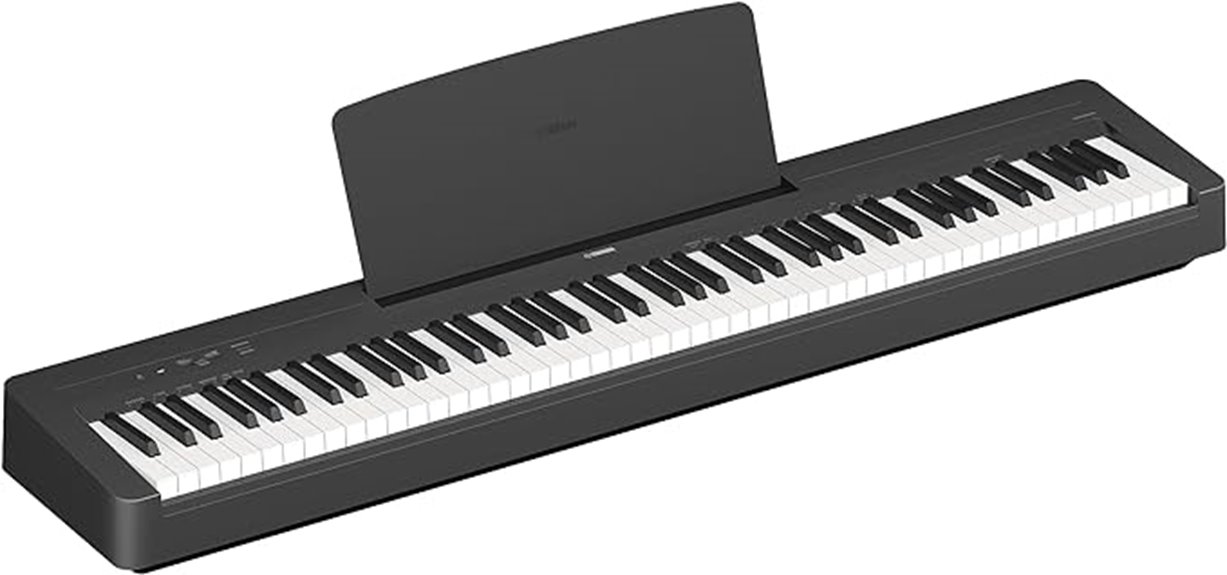
If you’re looking for a portable digital piano that delivers an authentic playing experience, the Yamaha 88-Key Digital Piano with Weighted Keys stands out. It features 88 graded hammer keys that mimic an acoustic piano’s feel, making it ideal for practice and performance. Its slim, lightweight design—around 24.5 pounds—ensures easy transport and fits seamlessly into any space. The piano offers rich, realistic sound with Yamaha’s sampled tones and wide velocity sensitivity. Connectivity options like USB to HOST and headphone jacks make it versatile for recording, teaching, or casual playing. Overall, it’s a compact, high-quality instrument perfect for musicians of all levels.
Best For: beginners, students, and amateur musicians seeking a portable, authentic-feeling digital piano for practice, performance, and creative exploration.
Pros:
- Authentic acoustic piano feel with weighted, graded hammer keys (GHC action)
- Compact, lightweight design weighing approximately 24.5 pounds for easy transport and space-saving setup
- Rich, realistic sound quality with Yamaha’s sampled tones and wide velocity sensitivity
Cons:
- Included sustain pedal is simple and may lack advanced features found in higher-end models
- Muffled sound compared to traditional acoustic pianos, which may affect nuanced playing
- Limited to 10 voice options, which might be restrictive for users seeking broader sound varieties
Factors to Consider When Choosing an 88‑Key MIDI Controller

When choosing an 88-key MIDI controller, I focus on key action and feel to match my playing style. I also check for software compatibility, connectivity options, and portability to make certain it fits my setup. Additionally, I consider extra control features that can enhance my workflow and creativity.
Key Action and Feel
Choosing the right key action and feel is essential because it directly impacts how naturally you can play and express yourself on an 88-key MIDI controller. Full-weighted keys with hammer action replicate an acoustic piano’s resistance and response, making them ideal for serious practice and performance. If you prefer faster, lighter touches or play electronic music, semi-weighted or synth-action keys might suit you better, offering less resistance and quicker response. The responsiveness and velocity sensitivity of the keys are also fundamental, as they enable nuanced dynamics and expressive control. Additionally, the quality of the keybed—its texture and mechanical response—significantly influences your overall playing experience. Finding a key action that feels comfortable and realistic helps you perform with confidence and authenticity.
Software Compatibility Options
Selecting an 88-key MIDI controller that seamlessly integrates with your digital audio workstation (DAW) is vital for smooth music production. I look for controllers that support my preferred DAW through compatible software or standard MIDI protocols, ensuring effortless control without complicated workarounds. It’s also helpful if the controller comes with bundled software or virtual instruments that complement my setup, saving me time and money. Compatibility with my operating system—whether Windows, macOS, iOS, or Linux—is essential to avoid connectivity issues. I also prioritize controllers with customizable MIDI mappings and editing tools, so I can tailor controls to my specific workflow. Finally, seamless integration with third-party plugins and virtual instrument libraries makes my production process smoother and more flexible.
Connectivity and Ports
Ensuring your 88-key MIDI controller has the right ports is crucial for smooth connectivity and seamless integration with your setup. Look for controllers with sufficient and compatible ports, such as USB, MIDI out, and sustain pedal inputs, to connect effortlessly with your devices and software. Support for multiple connection options like USB-C, USB-B, or traditional MIDI DIN is essential for matching your current gear and future-proofing your investment. Check if the ports support plug-and-play functionality, which allows quick setup without extra drivers or interfaces. Additionally, consider the number and types of ports, like multiple MIDI outs or CV/gate connections, for expanded hardware integration. Finally, ensure port specifications, such as USB 2.0 or 3.0, support the data transfer speeds needed for real-time control and low latency.
Size and Portability
The size and weight of an 88-key MIDI controller directly impact how easily I can transport and set it up, especially when I perform live or move between studios. Most models range from about 54 to 60 inches long, which influences how much space they occupy on my desk or stage. Lighter controllers, often under 15 pounds, are much easier to carry, making them ideal for gigs and mobile setups. Foldable or compact designs further enhance portability, especially for musicians who travel frequently. Slim profiles and reduced depth help fit controllers into tight spaces or alongside other gear. Considering size and weight guarantees I can transport and store my controller comfortably without sacrificing functionality or playability.
Additional Control Features
Additional control features like knobs, faders, and pads are essential for enhancing my real-time sound manipulation during performances or studio work. They let me tweak parameters instantly, making my workflow more expressive and efficient. Many controllers include transport controls such as play, stop, and record buttons, which streamline my interaction with DAWs without needing to switch screens. Assignable controls are a real game-changer, allowing me to customize knobs, sliders, and buttons for specific functions, saving time and boosting creativity. Pitch and modulation wheels add expressive control over vibrato and pitch bends, crucial for live performances. Some controllers even incorporate effects, mixer, and transport controls, giving me extensive hands-on management of my software instruments and projects.
Build Quality and Durability
Choosing an 88-key MIDI controller that can withstand frequent use means paying close attention to build quality and durability. High-quality models often feature sturdy materials like metal chassis or reinforced plastic, which resist wear and tear. The keys should be semi-weighted or fully weighted, designed to endure extensive playing without sticking or malfunctioning. Well-made controllers also have durable knobs, faders, and buttons that remain sensitive and functional over time. The overall frame and keybed should prevent flexing or rattling, especially during lively performances or transport. Opting for models with reinforced joints and quality internal components can notably extend the lifespan and ensure consistent performance, even with regular handling. Durability is essential for reliability and long-term value.
Frequently Asked Questions
How Do Weighted Keys Impact Playing Experience and Performance?
Weighted keys really enhance my playing experience because they mimic an acoustic piano’s touch, giving me better control and expression. They respond to how hard I press, making it easier to convey dynamics and emotion. This sensitivity helps me perform more authentically, whether I’m practicing or composing. Overall, weighted keys make my playing feel natural, improving both my technique and performance quality.
What Is the Significance of MIDI Connectivity Options?
Imagine having endless musical possibilities at your fingertips—that’s what MIDI connectivity offers. It’s not just about linking devices; it’s about opening a world of sounds and control. Good MIDI options guarantee smooth integration with your setup, making your creative flow seamless. Whether for recording, live performance, or experimenting, flexible MIDI connectivity keeps your music evolving effortlessly, turning your ideas into reality with ease and precision.
Are Built-In Sounds Necessary for an 88-Key MIDI Controller?
When considering if built-in sounds are necessary, I think it really depends on your workflow. I prefer controllers without them because I can choose my own sounds and stay flexible. Built-in sounds can be handy for quick ideas or practice, but I find that most musicians, including myself, rely on external plugins or software. Ultimately, it’s about what helps you create best.
How Important Is Portability for Studio and Live Use?
Did you know nearly 60% of musicians switch between studio and live setups? Portability really matters, I think, because it lets you perform or record anywhere with ease. A lightweight, compact controller makes it simple to pack up and head out, saving time and effort. For me, choosing a portable MIDI controller means I can stay creative on the go—without sacrificing the quality or features I need.
What Maintenance Is Required to Keep an 88-Key MIDI Controller in Optimal Condition?
When it comes to maintaining my 88-key MIDI controller, I make sure to keep it clean and dust-free by wiping it regularly with a soft, dry cloth. I also check the connections and update firmware when needed to prevent glitches. Avoiding excessive moisture and protecting it from extreme temperatures helps keep it in top shape. With simple upkeep, my controller stays responsive and reliable for both studio and live gigs.
Conclusion
Choosing the right 88-key MIDI controller can truly open new musical doors for you. While it’s easy to feel overwhelmed by options, trust that each of these models offers something special to help your creativity flourish. Remember, finding the perfect fit isn’t just about specs—it’s about how it inspires you to express yourself. With a little patience, you’ll discover a tool that feels like an extension of your musical soul.


